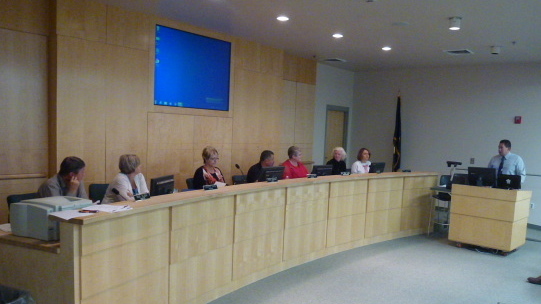Alex Simpson’s PowerPoint budget presentation has its moments of gallows humor: a pair of slides depicting Wile E. Coyote.
Like the mishap-prone predator of Looney Tunes lore, the Meridian School District is peering over a precipice. But the district’s fiscal cliff is no laughing matter. And the trouble is looming in 2014-15, says Simpson, Meridian’s finance director.

On Tuesday night, the state’s largest school district approved a $178.7 million budget for 2013-14, virtually unchanged from the 2012-13 budget. The district’s budget was $199 million in 2008-09 — before the Great Recession took hold, and before the district’s enrollment swelled from 33,449 to its current 35,645.
And that may not even be the worst of it. And the factors contributing to Simpson’s “perfect storm” scenario aren’t unique to Meridian:
Enrollment. A bottom-line cost driver in a state that allocates education dollars based on student headcount. For years, Meridian has been accustomed to large enrollment increases — which pose its own challenges, but comes with state funding attached. For 2013-14, the projected enrollment increase is 550, more or less in line with recent years.
And in future years, enrollment could flatten, as incoming waves of new kindergartners come more or less in line with high school senior classes.
Dwindling reserves. In order to keep afloat, the Meridian district has been spending cash reserves at an “unsustainable rate,” Simpson told School Board members this week. The district expects to close 2013-14 with a $1.7 million fund balance. Meridian closed the 2008-09 budget year with more than $18.5 million in the bank.
Meridian wouldn’t be the first district to operate with little to no cushion. In the cash-strapped Nampa School District, budget reserves have been depleted — forcing the state’s third largest district to secure a $6.3 million line of credit to meet payroll and pay bills through this summer.
Sequestration. The mandatory across-the-board federal budget cuts are taking their toll in Meridian and other school districts. Meridian’s special education program will use its reserves to get through 2013-14; cuts are looming in 2014-15.
The supplemental levy. Meridian voters passed a two-year, $28 million levy in March 2012. But that means the levy expires next year. Does Meridian go back to voters for a renewal in 2014 — at roughly the same time the district might seek a bond issue to cover school building projects?
When districts’ supplemental levies fail, the impacts can be immediate; weeks after its levy proposal went down to defeat in May, Eastern Idaho’s Jefferson School District slashed library staff. And Meridian administrators are familiar with the fallout from an unsuccessful levy. When a supplemental levy failed in May 2011, the district was forced to make up a $10 million difference — and that year, Meridian wound up eliminating 61.51 teaching positions, cutting six days from the school calendar, and going without a staff training day.
As is typical of Idaho school districts, much of Meridian’s budget is tied up in personnel: 90 percent, to be precise. That leaves the district few options to balance a tight budget in 2014-15 or beyond: It can reinstitute furlough days; cut benefits costs; or reduce the work force. If there are other options, Simpson told trustees, district staff is all ears.
No suggestions were forthcoming.
“It’s been a tough time, but we’re still going,” School Board Chairman Mike Vuittonet said after Simpson’s somber presentation.
School Board member Anne Ritter wasn’t quite so upbeat, half-seriously chiding Simpson for a depressing report.
As the state’s largest school district, Meridian is a budgetary bellwether of sorts. But Meridian’s perfect storm is not Meridian’s alone.
